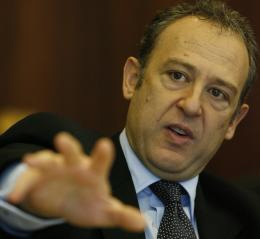
|  |  |  News Around the Republic of Mexico | November 2008 News Around the Republic of Mexico | November 2008  
Mexico Worries About Obama Agenda
 Dudley Althaus - Houston Chronicle Dudley Althaus - Houston Chronicle
go to original


| | Ambassador Arturo Sarukhan says opening NAFTA to new talks could wreck it. (Karen Warren/Chronicle) | | |
Government, business leaders unsure if he wants to change NAFTA

Mexico City While Brack Obama fascinates many Mexicans, government officials and business executives here are concerned about what his administration might mean for their country.

No international relationship is more important to Mexico than that with the United States, and both countries have been governed for the past eight years by conservatives who shared a common ideology, if not always national interests.

As a Texan, George W. Bush has been knowledgeable about both Mexico and border issues. But Obama, a liberal Democrat from a Northern state, remains an unknown to many here.

Mexican officials want to make sure the president-elect and his supporters understand how essential Mexico remains to the United States.

"We have to convince our citizens on both sides of the border that we are co-stakeholders in this very important relationship," Arturo Sarukhan, Mexico's U.S. ambassador, told Chronicle reporters and editors during a recent visit to Houston. "If we can't do this, we'll have a very rough time."

Calderon's concerns

Mexican President Felipe Calderon met with Obama's representatives, including former Secretary of State Madeleine Albright, while in Washington for the recent 20-nation summit on the world financial crisis.

Calderon later said he had expressed his government's concerns that a "return to protectionism would only lessen the possibilities of overcoming the current economic crisis."

In other meetings with congressional leaders, Calderon emphasized concerns about weapons smuggled from the United States that arm Mexico's drug-trafficking syndicates.

"What is going to be important is to see how fast we can have Mexico included as one of the priorities for the new administration," said Jorge Treviρo, a Mexican deputy foreign minister in the 1990s.

The U.S.-Mexico relationship is complex, of course: immigration, drug trafficking and criminal violence; environmental issues and deep trade relations; a shared 2,000-mile border.

"If you look at the day-to-day impact that any country has on the security, economic well-being and prosperity of the Americans, then there is no country more important than Mexico," Saruhkan said.

Perhaps most worrying for many here is what might be Obama's intentions for the North American Free Trade Agreement, or NAFTA.

The agreement which has dropped most trade barriers among the United States, Mexico and Canada went into effect in 1994. Since then, trade has exploded to about $900 billion annually.

But NAFTA has created losers as well. Mexican farmers complain they are being destroyed by cheap grain imports from north of the Rio Grande. Labor unions in the Midwest blame NAFTA for the loss of hundreds of thousands of manufacturing jobs.

A slippery slope

During the Democratic primaries, Obama repeatedly criticized NAFTA, saying that the agreement has cost the U.S.

a million jobs. He promised to renegotiate the treaty.

Sarukhan said that opening the agreement to new talks would prove a slippery slope, which, he said, would wreck the deal.

Mexico and Canada would want to renegotiate issues other that those favored by the United States, he said, and legislators in all three countries would weigh in on changes. That might be particularly risky in Mexico, he said, because an opposition-controlled Congress could scuttle many of Calderon's initiatives.

"Renegotiating NAFTA is like throwing a monkey wrench into the competitiveness of America. It's a bad idea," he said. "The probable end game of that is going to be the meltdown of what we've built over these past 15 years."

But NAFTA rarely came up during the presidential campaign, and Obama softened his message on the treaty and other trade deals, said Andrew Selee, director of the Mexico Institute at the Woodrow Wilson Center, a Washington think tank.

Mexican officials want to negotiate a comprehensive treaty for legalizing Mexican workers, at least temporarily, in the United States.

Former President Vicente Fox pushed hard to win such an agreement with Bush after both took office in 2001. But that effort was derailed by the Sept. 11 terrorist attacks.

Like Fox, Calderon has argued that NAFTA should be "deepened" by providing for the flow of labor across the U.S. border.

"The 800-pound guerrilla in the room is labor mobility," Sarukhan said. "The fact that we have labor-intensive and capital-intensive economies living next to each other provides us with new sysnergies to be able to compete."

But Sarukhan acknowledged that an immigration deal probably couldn't be seriously discussed with Obama for a few years. "It's become too much of a toxic issue" with the American public, he said.

dudley.althaus(at)chron.com |

 |
|  |



